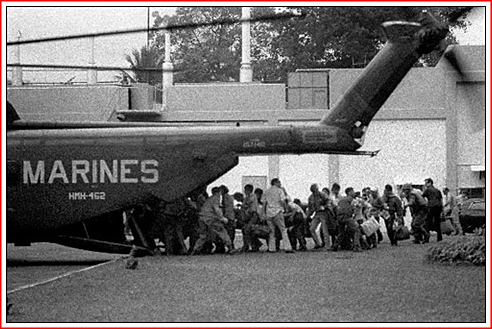
History is a compendium of individual human stories, oft caught up in a world event. That’s what drives the riveting documentary Last Days in Vietnam, which chronicles the desperate attempts of many South Vietnamese to escape before the Communist takeover in 1975. Over 140,000 got out in the initial exodus, including 77,000 through the means depicted in this film – mostly compressed into just two panicked days.
As if there weren’t enough American folly in Vietnam, the first evacuation plan didn’t include any non-Americans, even including the Vietnamese dependents of Americans. Then there were evacuation plans that were never implemented because of the blockheadedness of the US Ambassador. In the final week, young American military and intelligence officers took matters into their own hand, and began a sub rosa evacuation – ignoring the chain of command, breaking immigration laws and risking career-killing charges of insubordination.
Last Days in Vietnam is directed by Rory Kennedy (daughter of RFK), who recently made Ethel, the affecting bio-doc of her mother. Kennedy does a good job of setting the historical stage for those who didn’t live through the era, and then letting the witnesses tell their compelling personal stories.
The talking heads include:
- the six-year-old who jumped out of a helicopter and then watched his mother drop his baby sister on to a ship’s deck;
- the US Navy vet who plays the taped diary that he sent home to his wife after the fateful day;
- the CIA analyst who unsuccessfully tried to convince the deluded US Ambassador that the end was at hand;
- the college student who managed to get over a wall inside the embassy, but found that his freedom was not guaranteed;
- Ford Administration officials Henry Kissinger and Ron Nessen, who relate the White House view of the events.
One heroic young American officer managed with ingenuity and chutzpah to get out hundreds of Vietnamese. In the film’s most poignant moment, it falls to him to tell the final American lie to the 400 Vietnamese remaining in the US embassy, for whom there were no more helicopters.
I saw the movie in San Jose with an audience that was about half Vietnamese-American, some of the age to have lived through this period. San Jose’s 100,000 Vietnamese population is largest of any city outside Vietnam, and many Vietnamese-Americans still memorialize the subject of this film as Black April. The exit from the theater was somber.
Last Days in Vietnam is a PBS American Experience film, so I expect it to show up on TV within the year.
